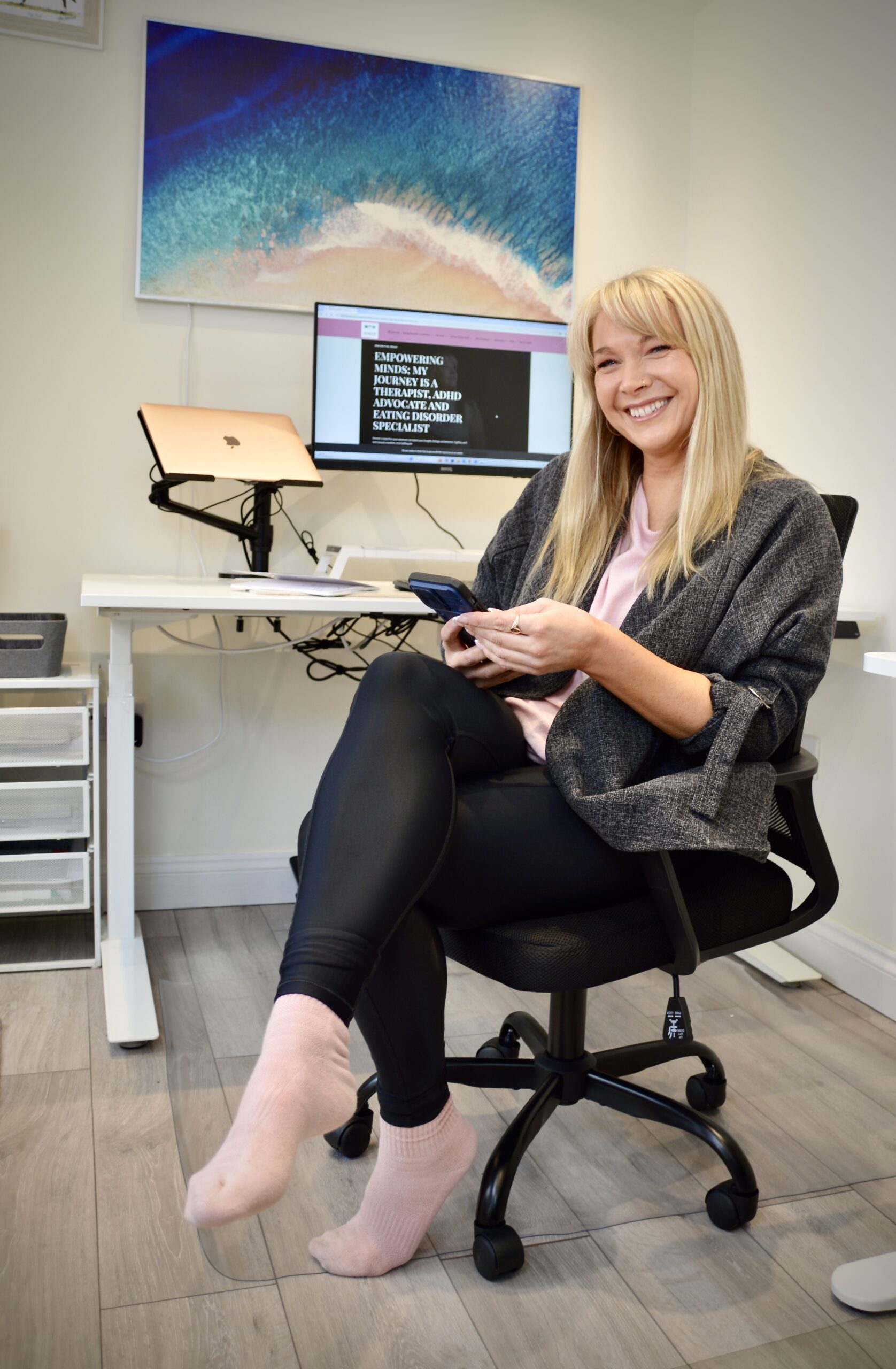Obsessive Compulsive Disorder Intrusive Thoughts
Intrusive thoughts aren’t who you are. They’re just thoughts.
If you’ve ever been ambushed by a sudden, distressing idea that makes no sense, feels out of character, or leaves you wondering what’s wrong with me, you’re not alone. Intrusive thoughts affect many of us, especially if you live with anxiety, depression, trauma, or are neurodivergent.
Here’s how I help clients gently and effectively work through them in therapy without shame or judgment.
Redirecting with Care
What Are Intrusive Thoughts, Really?
Intrusive thoughts are unwanted, repetitive, and often distressing ideas that can feel impossible to switch off. You might picture something violent, imagine an accident, or hear a voice telling you you’re a bad person. They’re not truths. They’re not predictions. They’re just thoughts.
But I know they can feel loud, scary, and consuming. And when you live with ADHD, autism, trauma, or OCD tendencies, they often show up on a loop.
So, let’s break the shame cycle and look at what helps.
The natural reaction? Push them away. Block them out.
But the brain doesn’t work like that. Suppression often makes intrusive thoughts stick harder.
Instead ➔ acknowledge the thought without feeding it. Then gently shift your focus. Clients often find it helpful to use a grounding activity like:
•Going for a walk
•Doing something sensory (like drawing, crafting, or baking)
•Listening to calming music or audio
•Naming five things you can see, touch, hear
This redirection builds new neural pathways—and it’s more powerful than white-knuckling your way through.
Recognizing Patterns
Identify Patterns and Triggers
Intrusive thoughts often aren’t random.
They tend to spike:
➔ When you’re burnt out
➔ When you’re bored or overwhelmed
➔ After conflict or big life changes
➔ Around hormonal shifts or poor sleep
Journaling is one of the most effective ways I help clients spot patterns. It doesn’t need to be fancy, just keep a note of:
-
When the thought occurred
-
What you were doing or feeling
-
What was happening around you
We then use that insight in therapy to build emotional regulation skills and create safety.
Building Positive Anchors
Tip 3 — Create Positive Anchors
Intrusive thoughts thrive in chaos, exhaustion, and unpredictability.
So one of the first things I look at with clients is: Where can we build calm, safety, or routine?
Some simple wins:
-
Waking and sleeping at consistent times
-
Decluttering a small space
-
Using soothing routines (like lighting a candle before bed)
-
Reducing social media scroll-time
-
Watching or listening to something light and funny
These small shifts create mental bandwidth and help retrain the brain to move away from threat.
How To Overcome Anxious Thoughts
Separating Self from Thoughts
This one’s big.
Just because a thought feels real doesn’t mean it is.
One thing I always teach my clients: We are not our thoughts.
An intrusive thought about something awful doesn’t mean you want to do it.
A thought that says “you’re worthless” isn’t the truth.
It’s just your brain firing off protective, anxious noise.
Therapy can help you build the muscle to notice the thought without believing it. That’s emotional freedom.
Reach Out for Support
You deserve support.
So many people struggle with intrusive thoughts in silence, especially if they feel ashamed or afraid of being judged.
But here’s the truth ➔ there is nothing shameful about your thoughts.
They’re just trying to tell us something about your stress levels, your unmet needs, your trauma history, or your inner critic.
I offer safe, confidential online walk-and-talk therapy for teens and adults who feel stuck, scared, or overwhelmed by their minds. Whether you’ve never had therapy before or you’re returning after a relapse, I meet you where you are.
Crisis Resources
Immediate Help
If you are in a crisis or feeling unsafe, it’s crucial to seek help immediately. Dedicated resources are available to provide support and guidance during these challenging times. Don’t hesitate to contact these services if you need urgent assistance.
Here are some vital contacts for immediate support:
• Call Samaritans: 116 123 for confidential support at any time.
• Text Shout: 85258 for a free, 24/7 text service.
• Call Mind: 0300 123 3393 for mental health support and information.
• Call Rethink Mental Illness: 0300 5000 927 for advice and support for those affected by mental illness.
Becky Stone
I’m Becky Stone, a qualified eating disorder therapist based in the UK.
I work with both teens and adults who feel overwhelmed by intrusive thoughts, shame, and anxiety. Many of my clients are also neurodivergent, navigating ADHD or burnout alongside mental health challenges. My style is calm, relational, and trauma-informed.
I offer online counselling and walk-and-talk sessions in Canterbury. You’re welcome precisely as you are.
Take the First Step Toward Healing
Intrusive thoughts don’t make you broken. They make you human.
If your mind feels loud, heavy, or stuck on repeat, I’m here to help you untangle those patterns gently, at your pace. You don’t have to navigate this alone.
I offer online counselling and walk-and-talk therapy in Canterbury for adults and teens. Together, we’ll create space for healing that’s shame-free, neurodivergent-affirming, and led by compassion.
Ready to take the first step? Let’s connect and explore what recovery could look like for you.







